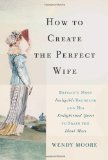Summary | Excerpt | Reviews | Beyond the Book | Read-Alikes | Genres & Themes | Author Bio
Britain's Most Ineligible Bachelor and his Enlightened Quest to Train the Ideal Mate
by Wendy Moore

 Book Reviewed by:
Book Reviewed by:
Norah Piehl
Buy This Book
This article relates to How to Create the Perfect Wife
 Wendy Moore illustrates the various cultural influences that led to Thomas Day's peculiar experiment. Among these are the Pygmalion myth (later popularized in George Bernard Shaw's play by that name, as well as the musical, My Fair Lady, based on Shaw's play) and, perhaps most influentially, Jean-Jacques Rousseau's book, Emile, or On Education. First published in 1762, the educational treatise uses novelistic conventions (such as character and plot) to illustrate Rousseau's theories on the best way for the individual to retain innate goodness while still participating as a functioning member of society. It's divided into five parts, beginning with very young childhood and eventually exploring the ideal route for the individual to choose a trade, become a productive member of society, and choose a spouse - sort of a roadmap for how to balance the state of nature with the demands of society.
Wendy Moore illustrates the various cultural influences that led to Thomas Day's peculiar experiment. Among these are the Pygmalion myth (later popularized in George Bernard Shaw's play by that name, as well as the musical, My Fair Lady, based on Shaw's play) and, perhaps most influentially, Jean-Jacques Rousseau's book, Emile, or On Education. First published in 1762, the educational treatise uses novelistic conventions (such as character and plot) to illustrate Rousseau's theories on the best way for the individual to retain innate goodness while still participating as a functioning member of society. It's divided into five parts, beginning with very young childhood and eventually exploring the ideal route for the individual to choose a trade, become a productive member of society, and choose a spouse - sort of a roadmap for how to balance the state of nature with the demands of society.
 Rousseau's book, as Moore mentions, was not intended to serve as any kind of parenting model, however it does contain a great deal of very specific advice, such as the prioritization of observation and interaction with nature over any kind of conventional academic education in early childhood. Rousseau also advocates the strengthening of the child's body through exposure to the elements. Instruction in more abstract topics such as philosophy and religion, he says, should only be embarked upon once the adolescent has fully developed reason and rationality. It's not surprising, given the specificity in Rousseau's work, that some eighteenth-century parents, including Day's good friend Edgeworth, decided to put Rousseau's ideas to the test, with unintended and sometimes detrimental results.
Rousseau's book, as Moore mentions, was not intended to serve as any kind of parenting model, however it does contain a great deal of very specific advice, such as the prioritization of observation and interaction with nature over any kind of conventional academic education in early childhood. Rousseau also advocates the strengthening of the child's body through exposure to the elements. Instruction in more abstract topics such as philosophy and religion, he says, should only be embarked upon once the adolescent has fully developed reason and rationality. It's not surprising, given the specificity in Rousseau's work, that some eighteenth-century parents, including Day's good friend Edgeworth, decided to put Rousseau's ideas to the test, with unintended and sometimes detrimental results.
More controversially, at least in hindsight, were Rousseau's views on women espoused in Emile, particularly in the section on the development of Sophie, Emile's ideal mate. About women, Rousseau writes, "In what they have in common, they are equal. Where they differ, they are not comparable. A perfect woman and a perfect man ought not to resemble each other in mind any more than in looks." Rousseau's laissez-faire approach to education for boys is turned on its head when it comes to young Sophie, who apparently requires a far more structured education, one that stresses domestic arts, traditional handicrafts, and, most importantly, helping her realize her potential to "please man." Moore includes a portrait of Thomas Day, in which he holds a book in one hand, widely believed to be Rousseau's Emile. It's interesting to trace, in How To Create A Perfect Wife, how Day uses Rousseau's philosophy to suit his own ends.
Frontispiece to Rousseau's Émile by de Launay for the 1782 edition. The original caption read: "L'éducation de l'homme commence à sa naissance" ("A man's education begins at birth"). "In the foreground, a mother dutifully reads Émile as she breastfeeds one baby and changes another. Her daughter looks on, eager to learn from her mother's example. They are seated in a forest clearing at the foot of a pedestal bearing a larger than life bust of Rousseau, who by the 1780s had become a kind of patron saint for nursing mothers...In the background are scenes from Émile's childhood." (Quote from Mary Seidman Trouille. Sexual Politics in the Enlightenment: Women Writers Read Rousseau. Albany, NY: State University of New York Press, 1997)
Filed under People, Eras & Events
![]() This article relates to How to Create the Perfect Wife.
It first ran in the May 8, 2013
issue of BookBrowse Recommends.
This article relates to How to Create the Perfect Wife.
It first ran in the May 8, 2013
issue of BookBrowse Recommends.





The Funeral Cryer by Wenyan Lu
Debut novelist Wenyan Lu brings us this witty yet profound story about one woman's midlife reawakening in contemporary rural China.
Your guide toexceptional books
BookBrowse seeks out and recommends the best in contemporary fiction and nonfiction—books that not only engage and entertain but also deepen our understanding of ourselves and the world around us.